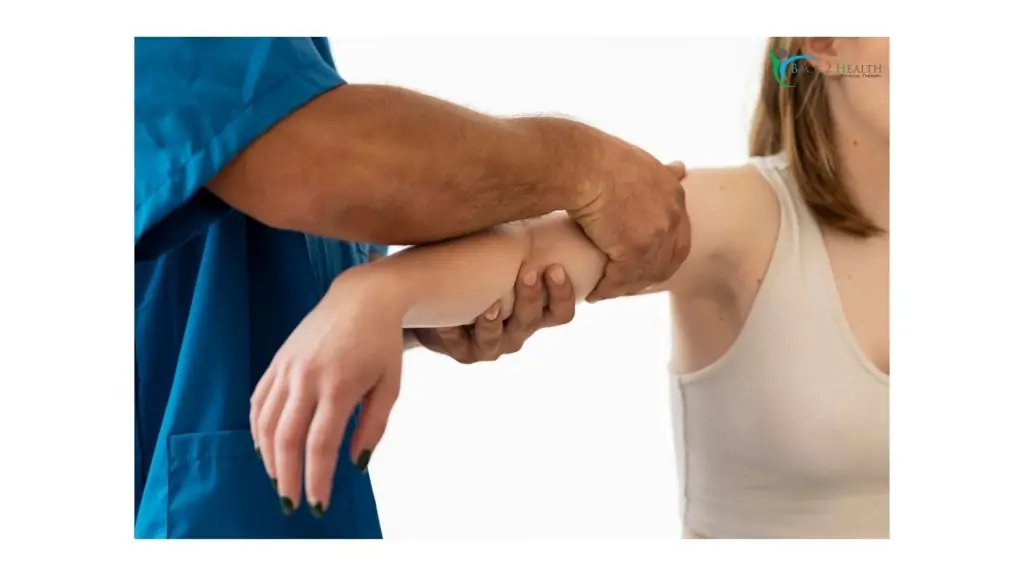The shoulder is one of the most complex and frequently used joints in the body, making it especially vulnerable to injuries. Among the most common shoulder issues are rotator cuff tears, which can cause significant pain, weakness, and limited mobility. When this happens, the road to recovery often begins with physical therapy for rotator cuff injury. At Back 2 Health, we specialize in helping patients regain strength, improve movement, and return to the activities they enjoy, whether that means playing sports, working comfortably, or simply lifting everyday objects without pain.
Understanding Rotator Cuff Injuries
The rotator cuff is a group of muscles and tendons that stabilize the shoulder and allow for smooth, controlled motion. Overuse, repetitive strain, trauma, or age-related wear and tear can all contribute to injuries. Symptoms usually include shoulder pain, stiffness, reduced range of motion, and difficulty lifting the arm.
Many patients fear that a rotator cuff injury automatically means surgery, but that’s not always the case. In fact, physical therapy is often the first and most effective step in treatment. By focusing on targeted exercises and gentle mobility training, therapy helps restore strength and function without invasive procedures.
Why Physical Therapy is Essential
Physical therapy for rotator cuff injury is designed to do much more than reduce pain—it addresses the root causes of weakness and immobility. Skilled therapists guide patients through progressive exercises that strengthen the shoulder muscles, improve posture, and promote long-term stability.
Some benefits of therapy include:
-
Pain management through manual therapy and guided movements.
-
Restored range of motion to make daily activities easier.
-
Strengthening exercises that support the joint and prevent re-injury.
-
Education on posture and movement techniques to protect the shoulder in the future.
By addressing both the symptoms and the underlying issues, physical therapy empowers patients to take control of their healing process.
When Surgery Becomes Necessary
In more severe cases, such as large rotator cuff tears or injuries that do not respond to conservative care, surgery may be recommended. While surgery can repair damaged tendons, the success of the procedure heavily depends on what comes afterward—rehabilitation.
That’s where shoulder surgery rehab plays a critical role. At Back 2 Health, we design comprehensive rehab programs that focus on gradual recovery, ensuring patients regain full use of their shoulder while minimizing complications.
The Importance of Shoulder Surgery Rehab
Recovering from surgery is not just about healing the incision site. It’s about retraining the shoulder to move naturally again. Without proper rehab, patients may experience stiffness, muscle weakness, or even recurring pain.
A structured shoulder surgery rehab program typically includes:
-
Early-stage therapy to control pain, reduce swelling, and protect the repair.
-
Gentle mobility exercises to restore movement without straining the joint.
-
Progressive strengthening to rebuild shoulder muscles safely.
-
Functional training that prepares patients to return to work, sports, or hobbies.
Our therapists guide patients through each stage, making adjustments as needed to ensure safe progress at a comfortable pace.
Back 2 Health’s Approach to Shoulder Recovery
At Back 2 Health, we believe every patient’s recovery journey is unique. That’s why our team develops individualized care plans based on the specific type of rotator cuff injury or surgical repair. Whether you need physical therapy for a rotator cuff injury or post-surgery rehabilitation, we focus on building strength, restoring motion, and preventing future injuries.
Our approach combines hands-on therapy, guided exercise, patient education, and long-term maintenance strategies. We also provide ongoing encouragement and support, helping patients stay motivated throughout their recovery.
Preventing Future Shoulder Problems
While injuries can’t always be avoided, there are steps you can take to protect your shoulders:
-
Maintain good posture, especially during work or sports.
-
Strengthen supporting muscles like the upper back and core.
-
Warm up properly before physical activity.
-
Avoid repetitive overhead movements without breaks.
-
Listen to your body—don’t push through sharp pain.
Prevention is just as important as recovery, and therapy equips you with the tools to maintain healthy shoulders for years to come.
Conclusion
Recovering from a shoulder injury takes time, patience, and the right guidance. Whether you’re dealing with a tear that requires physical therapy for rotator cuff injury or healing after surgery with shoulder surgery rehab, the goal is the same—restoring strength, mobility, and confidence in your shoulder.
At Back 2 Health, we are committed to providing compassionate, results-driven care that helps patients return to their active lifestyles. With personalized therapy programs and expert support, we make recovery achievable and sustainable. Don’t let shoulder pain limit your life—take the first step toward healing today with the team at Back 2 Health.
Tags: shoulder surgery rehab, physical therapy for rotator cuff injury



